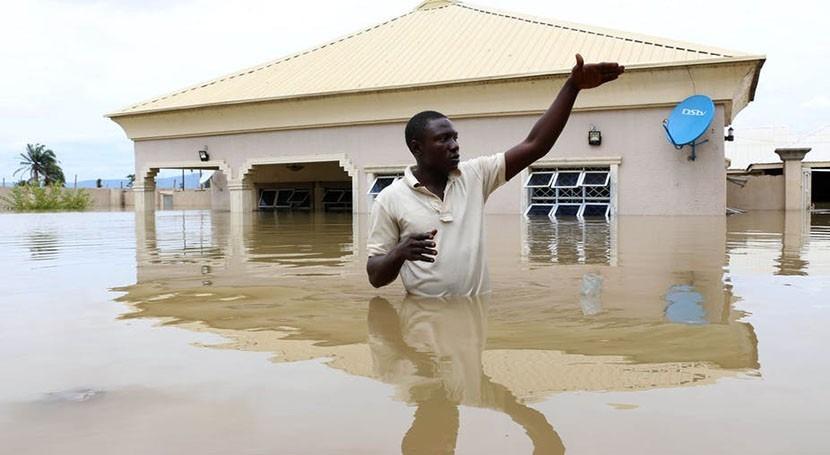Housing is a fundamental human need, providing not just shelter but also protection for individuals and their environment.
However, in Nigeria, a nation grappling with a significant housing shortage due to its burgeoning population and rapid urbanization, this basic necessity is becoming increasingly out of reach for many.

The situation, already dire, is being exacerbated by recurrent flooding, which has devastated communities, displaced millions, and intensified the housing crisis in the country.
Nigeria, with an estimated population exceeding 200 million, has seen its infrastructure, particularly housing, stretched to the breaking point. The housing deficit is enormous, with current estimates suggesting that the country is short of 28 million housing units.
This shortfall is not just a statistic but a stark reality for millions of Nigerians who struggle to find affordable and adequate housing. The recent and frequent incidents of flooding have only added to this burden, displacing families, destroying homes, and eroding the already fragile housing situation.
According to reports, the floods of 2022 stand as one of the most devastating in Nigeria’s recent history. Triggered by unusually heavy rainfall, which has been linked to climate change, and the release of excess water from Dams, the floods wreaked havoc across 34 states, displacing over 2 million people. In Anambra State alone, 526,215 people were displaced, while in Bayelsa, the hardest-hit region, 700,000 people were forced to flee their homes as floodwaters engulfed over 300 communities. These numbers represent not just a temporary inconvenience but a significant blow to the nation’s housing infrastructure.
READ ALSO: Experts Urge Comprehensive Urban Planning to Combat Flooding in Nigeria
The impact of flooding is not confined to immediate displacement. It has long-term consequences for the housing sector, as the destruction of homes means a loss of housing stock, further widening the deficit. In states like Borno, more than six camps housing nearly 16,000 internally displaced persons (IDPs) were destroyed, forcing the already vulnerable populations into emergency shelters and makeshift accommodations. The flooding has also led to the closure of IDP camps, such as in Bayelsa, where the government had no choice but to shut down camps as the floods overwhelmed the state’s capacity to provide safe refuge.
The housing crisis in Nigeria is further compounded by the ongoing demolition of buildings, particularly in urban areas like Lagos and other key states. While some experts argue that demolition is necessary to address urban sprawl and ensure safe living conditions, others contend that it is exacerbating the housing shortage. With each demolished building, more Nigerians are left without a home, further straining an already overstretched housing market.
In Abuja, the capital city, the housing situation is particularly acute. The cost of living, especially in terms of rent, is prohibitively high for many low-income earners. Major cities across Nigeria are characterized by exorbitant rents and high service charges, especially in gated communities where residents must pay monthly fees for services like security and maintenance. Despite the clear demand for affordable housing, the country’s housing policies and regulations have failed to keep pace with economic realities, leaving millions without access to decent, affordable homes.
Ironically, amidst this housing shortage, Nigeria is dotted with abandoned and uncompleted buildings. These structures, often victims of bureaucratic bottlenecks, corruption, and outdated land use regulations, stand as silent witnesses to the inefficiencies plaguing the housing sector. Instead of providing shelter, they become havens for criminal activities, contributing to the insecurity that further complicates the housing crisis.
The federal government has acknowledged the housing deficit and has taken steps to address it, under the leadership of Architect Ahmed Dangiwa driving President Tinubu’s renewed hope initiative to make housing a priority. The 2024 Appropriation Bill, recently signed into law, includes budgetary allocations for the Federal Ministry of Housing and Urban Development. The ministry is tasked with improving housing availability, but the scale of the challenge remains daunting.
The current housing deficit, coupled with the devastating impact of flooding, underscores the need for urgent and effective action. According to the 2019 Nigeria Living Standards Survey, more than 49% of urban households rent their homes, while only 32.5% of Nigerians in urban areas own their homes. This disparity highlights the importance of realistic measures and adequate resource allocation to close the affordable housing gap.
The National Emergency Management Agency (NEMA) has reported that the ongoing flooding has already claimed 179 lives and displaced 208,655 people across 22 states this year alone. The destruction has been widespread, with 107,652 hectares of farmland and 80,049 houses destroyed. States like Bauchi, Sokoto, and Jigawa have seen thousands of homes wiped out, leaving many families without shelter.
The causes of Nigeria’s flooding are largely human-induced, exacerbated by inadequate infrastructure and poor urban planning. Many residential areas lack proper drainage systems, relying instead on natural channels that are insufficient to handle the increased runoff caused by urbanization. The rapid expansion of cities, often unregulated, has led to the construction of buildings on floodplains and stormwater paths, further increasing the risk of flooding.
Historically, Nigeria’s approach to flooding has been reactive rather than proactive, focusing on post-disaster response rather than prevention. However, with the increasing frequency and severity of floods, there is a growing recognition of the need for a comprehensive flood risk management strategy. While the government has agencies like NEMA and the Nigerian Meteorological Agency (NiMet) that are equipped to address these challenges, the lack of coordination and communication between these bodies hampers effective action.
To mitigate the impact of flooding on housing, Nigeria needs to adopt a more integrated approach to urban planning, combining sustainable infrastructure with modern technology. Green infrastructure, such as permeable pavements and rain gardens, could help reduce runoff and manage stormwater more effectively. Additionally, improved early warning systems and better communication of flood risks could help communities prepare and respond more effectively to flooding.
The urgent need for the Nigerian government to build more houses and create an enabling environment for developers to construct affordable homes cannot be overstated. With a housing deficit of 28 million units, strategic measures must be taken to bridge this gap.
By prioritizing housing development and removing bureaucratic hurdles, the government can encourage private sector investment in affordable housing projects. This approach will not only provide millions of Nigerians with access to decent and safe shelter but also significantly reduce the housing deficit across the country, fostering social stability and improving the quality of life for its citizens.
The housing crisis in Nigeria is a complex issue, made more challenging by the increasing threat of flooding. As the country continues to urbanize and its population grows, the need for sustainable and resilient housing solutions becomes more critical. Without urgent action, the housing deficit will continue to grow, leaving millions of Nigerians without a safe place to call home.



